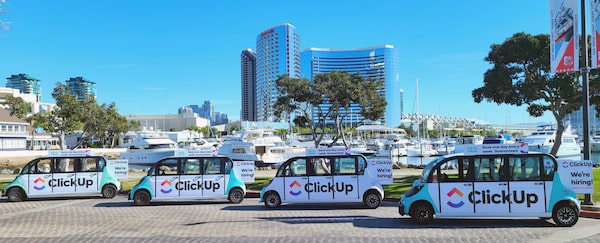Solving the transportation crisis, one electric shuttle at a time
How two long-time friends joined forces to make getting around just a little bit easier
Alex Esposito and James Mirras think traffic is a problem.
Growing up in East Hampton, New York, a busy summer seaside destination for city-dwellers, the founders often witnessed public tension around the hunt for parking. There was an under-utilized lot a little over a mile from the beach, but no one ever thought to go there. So, they’d watch people drive in circles in search of a spot, honking their horns and burning gas all the while.
The duo went their separate ways for college, but only after bonding over the notion that they could solve this hometown problem by eliminating traffic, reducing emissions and closing the gap of that loathed last mile between parking spot and final destination.
So, in 2011, Esposito and Mirras came back together and decided to do something: They thought up a design for an electric shuttle that would carry riders across the first and last miles of any trip, to and from transit stations, parking garages and other transportation hubs. They didn’t know it at the time, but the idea would one day evolve into Circuit, a full-fledged brand of electric shuttles.
They got car loans to purchase vehicles while Mirras bought a welding machine and taught himself how to customize five-seater shuttles. They leveraged the Hamptons’ community of visitors to sell advertising on the outside of the shuttles, which they used to bankroll the business, then called The Free Ride.

Circuit electric shuttlessupplied
Along the way, the pair created a fun, free, and eco-friendly micro-transit experience that eliminated car congestion. The business expanded into other beach towns and small cities, and by 2014, the two had enough momentum to quit their day jobs as consultants at top firms. Effecting a solution for the last-mile dilemma – a term that refers to the dreaded last leg of any trip between transport hub and final destination – before it became a buzzword, Esposito and Mirras now see that they were ahead of their time.
“Now we’re not just a free, ad-supported beach novelty,” Esposito says. “We’re key to downtown areas, moving people to transit, getting them to share rides in electric vehicles, and reducing the number of single occupancy vehicles on the road.”
With the support of URBAN-X, a Brooklyn-based startup accelerator funded by MINI and parent BMW Group that aims to revolutionize green urban transit, he and Mirras were able to take Circuit to new heights.
By 2016, the pair was working with major cities to solve traffic congestion, starting with San Diego, California. The city was looking for a downtown circulator to reduce pollution and parking challenges. Esposito and Mirras competed against Uber and Ford in the request-for-proposals — and won.
“We thought if we could combine the user experience our riders loved with ride-share services and the quality control, job creation, and sustainability benefits that cities look for, we could have an effective program,” Esposito says. “The city agreed.”
And through all that COVID-19 has thrown their way over the last year, Esposito and Mirras have continually stepped up to the challenge. As cities across the world went into lockdown in March, Circuit had the opportunity to showcase its potential.
“We believe if we can make it easier for people to get around in shared modes, then we can ultimately reduce the number of cars on the road.”
Alex Esposito
In New Rochelle, New York, one of the first COVID-19 hot spots, Circuit provided an essential shuttle service for first responders, many of whom were heeding the call for assistance from across the country to work in the city’s hospitals and needed transportation from their hotels on a daily basis. In Hollywood, Florida, Circuit’s commitment to the U.S. Center for Disease Control’s recommended high standards of safety — constant cleaning of the vehicles and temporarily ceasing pools — reassured the city that their service was a fit to get people to and from testing and vaccination centres. Circuit’s driver employees were also dispatched from Feeding South Florida food banks to deliver groceries to local seniors, allowing them to stay safely in their homes without compromising their food security.
“It wasn’t the year that we anticipated, but we showcased the flexibility of our services,” Esposito says, looking back. “This was a silver lining, allowing us to remain valuable to our communities.”
As parts of the U.S. begin to test the waters of reopening, Esposito says he’s excited about Circuit’s future. He’s keenly following the increased adoption of electric vehicles, now that cars like the MINI Cooper SE offer enhanced range and performance at a competitive price. Cities and community partners have embraced Circuit’s innovative business model of powering transit with advertising revenue to provide free services.
“We believe if we can make it easier for people to get around in shared modes, then we can ultimately reduce the number of cars on the road,” Esposito says. “That’s how we can ultimately lower emissions and solve the problems that traffic creates.”
Advertising feature produced by Globe Content Studio with MINI. The Globe’s editorial department was not involved.